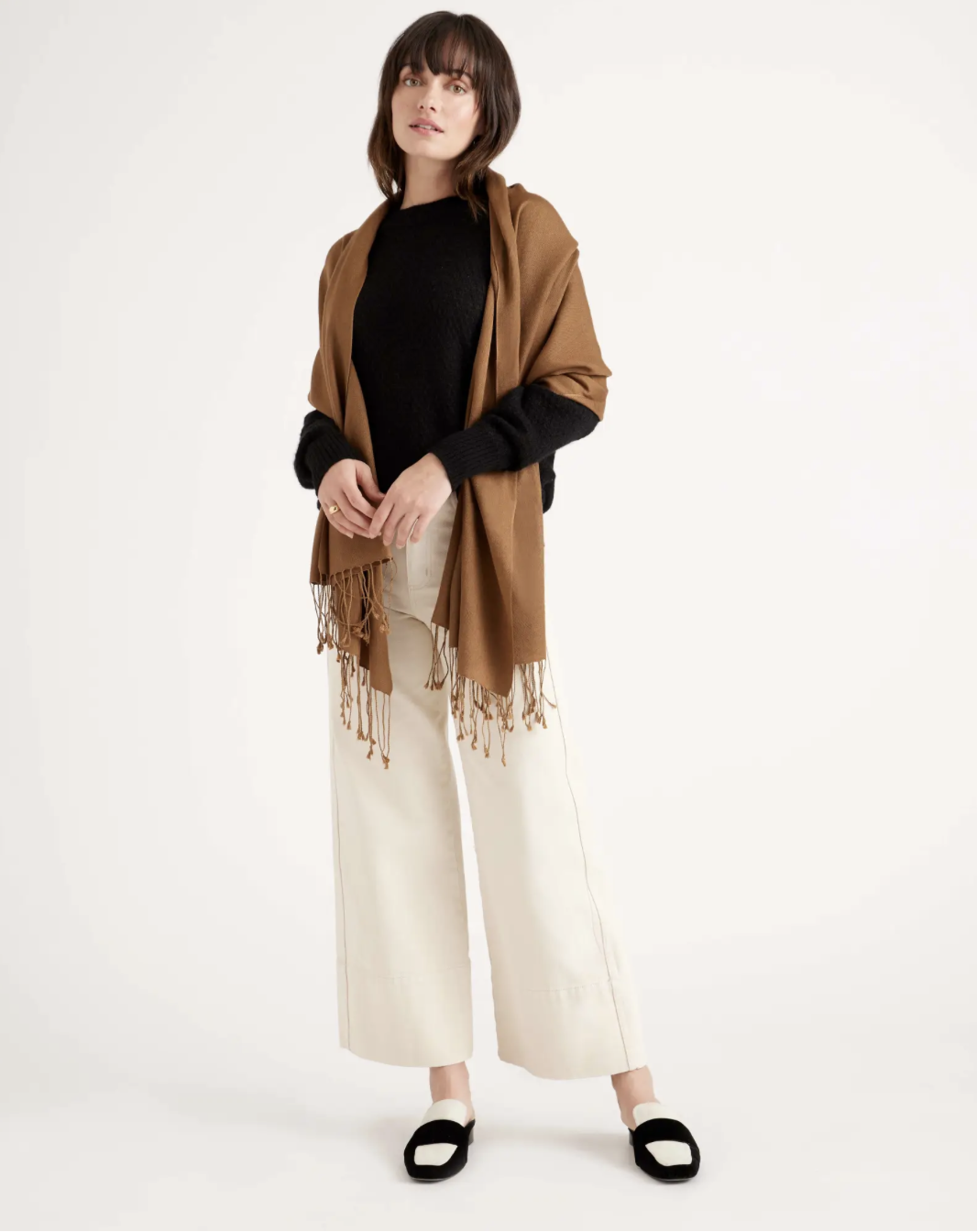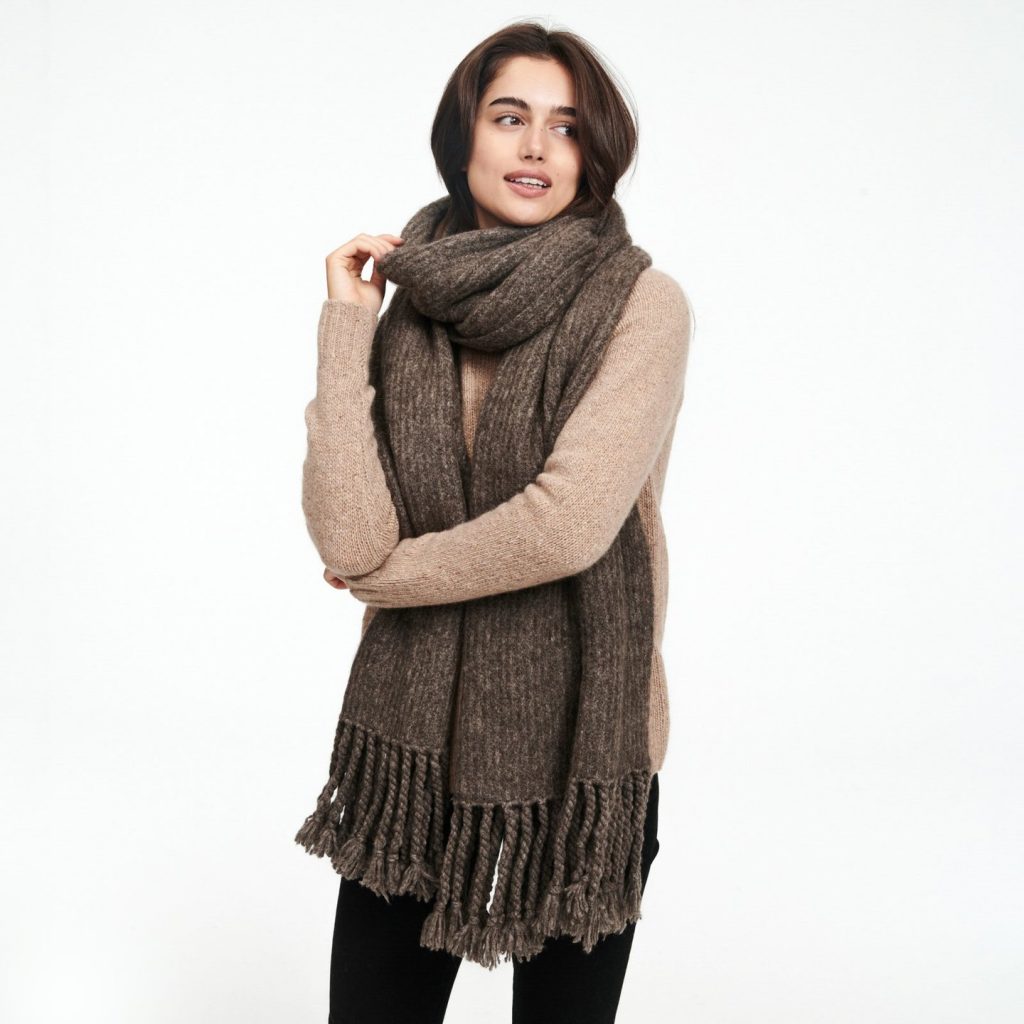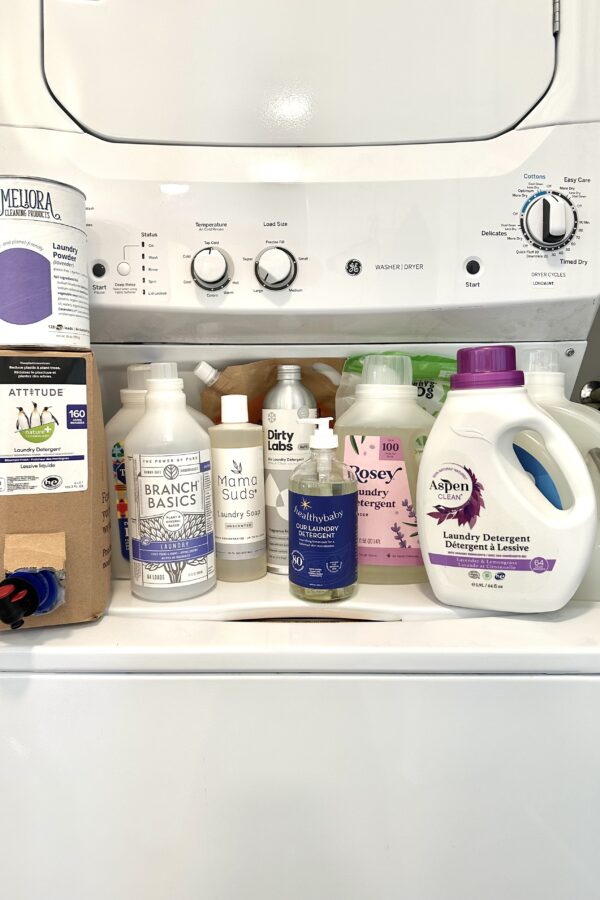I recently told you about some of my favorite brands for cozy winter sweaters and sweats made from natural and organic materials like organic cotton and wool.
But a sufficient fall and winter wardrobe isn’t complete without the necessary accessories: hats, gloves, and organic scarves!
So for this guide, I’ll give you a brief rundown for why you might want to skip the synthetics and go for organic cotton and/or wool scarves this year, and then I’ll give you my roundup of the best brands for natural, sustainable, and ethically made scarves to keep you warm this winter.
Table of Contents
This guide contains affiliate links, which means we may earn a small commission if you choose to make a purchase.
Featured Image Credit: Cuyana
Why Go For Natural & Non-Toxic Materials in a Winter Scarf?
These days, a lot of scarves are made out of synthetic materials like polyester and acrylic, which are not ideal for several reasons. First, most of these synthetics are byproducts of the fossil fuel industry, which, at current outputs, is toxic to our overall health.
Plus, scarves made from synthetic materials can shed microplastics as they’re worn and washed. These teeny, tiny pieces of plastic make their way into our ecosystems and waterways and are almost impossible to clean up. And it’s not only plants and animals that suffer because of it; these microplastics are making their way through our entire food chain and harming people as well.
Plus, clothing and accessories made from natural and organic materials are less likely to have toxic chemicals added to them throughout the manufacturing process. Notice that I said less likely—garments that are made of natural materials can still have various chemicals added. That’s why it’s still important to try and shop from brands that have policies in place to manage chemical safety and sustainability.
Types of Materials to Look for in a Healthier & More Eco-Friendly Winter Scarf
Instead of synthetics like acrylic and polyester, look for the following materials instead:
Cotton / Organic Cotton
Both conventional cotton and organic cotton are natural materials, so they’re both generally better options compared to most synthetics. Of course, organic cotton is the best option of the two because it’s grown without toxic synthetic pesticides and herbicides.
Look for labels like Global Organic Textile Standard (GOTS), which is a third-party certification indicating the cotton was grown and harvested using a specific set of standards.
Organic cotton is also a vegan-friendly option (whereas wool is not). It is also naturally hypoallergenic, whereas wool can be itchy and irritating for some people (although it can depend on the specific kind of wool).
Wool
When it comes to natural textiles for warm clothing and accessories, wool is one of the best options. It’s incredibly warm and durable and, when sourced properly, it’s very low-impact when it comes to animals, humans, and the planet.
Plus, wool is naturally odor- and wrinkle-resistant.
Of course, there are many different types of wool depending on the animal and area from which it was sourced. Different types of wool have varying pros and cons.
Merino Wool
Merino wool is one of the most widely used types of wool. It’s sourced from Merino sheep, which were originally bred in Spain and then later introduced to other parts of the world. Because Merino sheep live in areas without super harsh winters, their wool tends to be finer than other types of sheep wool.
As I mentioned, one of the downsides of sheep wool is that it can be itchy for some people. This is because of something all sheep produce, called lanolin. Lanolin is a waxy substance that helps to increase water resistance and protect the sheep’s wool and skin from rainfall. The finer their wool, the more lanolin the sheep produces. This means most Merino contains higher levels of lanolin and therefore might be more irritating to some people. Don’t be afraid to test it out because some people react to lanolin and others don’t!
Cashmere Wool
Cashmere wool is sourced from the undercoats of a specific type of goat in Mongolia. Goats don’t produce lanolin, which is why some people find cashmere to be more comfortable. It’s also finer and softer by nature compared to sheep’s wool. One of the downsides of cashmere, though, is that it tends to be less durable and more expensive.
Alpaca Wool
Most alpacas have evolved in climates where they’ve had to endure a wide range of temperatures throughout the year. Because of this, they’ve developed a unique kind of wool that is not only warmer than sheep’s wool, but also lighter and more durable due to its microscopic air pockets.
Linen
Linen is an eco-friendly option for lightweight scarves that are great for spring and summer (or even for layering in the colder months!). Linen is made from flax, which is a fast-growing plant that doesn’t require a bunch of pesticides or fertilizers—which is what makes it a more sustainable option.
Hemp
Even though it’s rare, hemp is a great eco-friendly fiber that can be used for scarves and other winter accessories.
Silk
Lastly, you’ll find some silk scarf options here, too. Silk banana-style scarves tend to be a beautiful, timeless option that can be dressed up for work or date night. They’re easy on skin and therefore are a great option for people with eczema, sensitive skin, or sensory concerns.
Of course, they’re not going to provide the same amount of warmth for winter, but you could always wear a silk scarf as a base layer around your neck and then wrap a thicker wool scarf around that!
Non-Toxic Dyes
The other factor to consider is the dye used to color the knitwear you buy. Since many textile dyes can include toxic chemicals, you want to look for brands that use non-toxic, azo-free dyes. These colorants are better for the wearer, the garment worker, and our ecosystems. Also look for third-party certifications like OEKO-TEX, which means the product has been tested for a long list of toxic substances.
The Best Organic Cotton and Wool Scarves to Keep You Warm in Winter 2024
The good news is that there is no shortage of amazing brands offering beautiful, versatile, and organic scarves for this cold-weather season. Here are some of my favorite brands:
Quince


Price Range: $60-70
I love Quince’s selection of scarves. They have a selection of different lightweight ones that come in different patterns and colors and can be used from fall to spring. Then they also have mid-weight ones that are better for wintertime… And they have cozy cashmere ponchos, too!
These super soft and versatile wraps and scarves are made from Grade A Mongolian cashmere, wool, and/or silk. They’re OEKO-TEX certified, too.
Eileen Fisher


Price Range: $118-298
A trailblazer in the world of sustainable fashion that’s actually beautiful, Eileen Fisher’s brand manufactures a variety of fall, winter, and spring scarves and ponchos that are made from organic cotton, linen, merino wool, cashmere, and more.
Kowtow


Price Range: $90-$120
Kowtow’s unisex scarves are made with 100% Fair Trade GOTS certified organic cotton. Throughout its entire supply chain, this New Zealand-based brand prioritizes ethical and sustainable processes and materials for all of the people, animals, and ecosystems involved.
Organic Basics

Price Range:
I’ve come to love a lot of Organic Basics’ products over the years (especially their organic activewear!).
Their ethically made gender-neutral scarves are made from 100% recycled merino wool. So not only is it made from natural fibers, but it keeps materials out of landfills, too!
Everlane


Everlane’s minimalistic sustainable scarves are made using natural materials like cashmere, wool, and alpaca.
They have lighter bandana styles that are perfect for fall, as well as thicker styles for winter, like waffle-knit Merino and patterned alpaca.
Everlane incorporates chemical management processes throughout its production using guidelines from third-party certifications such as bluesign and GOTS.
Smartwool


Price Range: $15-65
If you’re looking for something to wear during your cold-weather hikes or winter sports, Smartwool is a good option.
They carry solid-colored and patterned neck gaiters and balaclavas for adults and kids made mostly using 100% merino wool. (Some of their styles use synthetic-blended fabrics as well, so just check the details before buying.)
They offer solid-colored and patterned options, and most of their wool gaiters are reversible.
Peruvian Connection


Price Range: $29-69
Peruvian Connection carries a wide variety of scarves for fall and winter that come with gorgeous patterns and designs. Some of their styles are more suitable for cold weather, while others are lighter and great for fall and spring.
They use several different natural materials like baby alpaca, silk, wool, and cotton. Some of their scarves are mixed with synthetics, so just make sure to check the details of the specific scarf you’re looking at before buying so that you get what you want.
Theory


Price Range: $146-295
Theory’s gorgeous, luxury oversized scarves are made with 100% lightweight cashmere that will take you from fall through winter and even into the beginning of spring.
Naadam


Price Range: $145-295
Nadaam offers several different sustainable and ethical scarves (and gorgeous blankets!) made from natural and responsibly sourced cashmere. They come in a variety of beautiful solid colors.
They also carry a few fun jacket/scarf combos, where you attach or detach the scarf to the jacket.
Cuyana


Price Range: $98-198
I love Cuyana’s beautiful winter scarves. They are made in Peru out of super-soft and hypoallergenic baby alpaca, cashmere, and recycled wool.
Most of Cuyana’s garments are traceable from farm to factory. The pieces made from recycled wool and cashmere are third-party GRS (Glocal Recycle Standard) certified.
Kotn


Price Range: $50-148
A certified B Corp brand, Kotn makes gender-neutral scarves made from conventional and organic cotton, alpaca, and Merino wool.
They’re ethically made in Portugal using certified OEKO-TEX® non-toxic dyes. Some of them come with various other third-party certifications, too, including RWS (Responsible Wool Standard), and GOTS organic.
Also, some of their striped scarves give off Harry Potter vibes—just saying.
Made Trade


Price Range: $32-259
Made Trade is one of the best marketplaces for ethical and sustainable fashion. They carry a wide variety of beautiful scarves from brands like Anchal Project and others. These scarves are made from natural and sustainable materials like wool, organic cotton, silk, and linen.
While you shop, they make it super easy to filter according to your priorities. You can sort by material, value (vegan, BIPOC-owned, made in the USA, and more), price, and brand.
Rawganique


Price Range: $29-39
Rawganique is a clothing, accessories, and home goods brand that takes non-toxic manufacturing very seriously. Their unisex scarves are made in the U.S.A. out of organic cotton and hemp and are completely free from toxic dyes or other toxic chemicals.
They don’t have the largest selection of scarves in the world, but if you have chemical sensitivities or eczema, this is a safe brand to check out.
Zestt


Price Range: $13 (on sale) – $198
Zestt’s uber-popular and versatile scarves are ethically made in India out of either GOTS certified organic cotton or cashmere (some of which is recycled). Their scarves can cross seasons and are great for travel, too!
Maiwa


Price Range: $20-468 (for a 6-pack)
This is a really cool concept! Maiwa offers a variety of different scarves (mostly made out of cotton and linen) that you can dye yourself! You can shop from their variety of natural and plant-based dyes, and they have a ton of resources to help you create beautiful scarves yourself!
What’s your favorite brand for natural and organic scarves? Let us know if I’m missing a great brand and I’ll consider adding it to the list!





